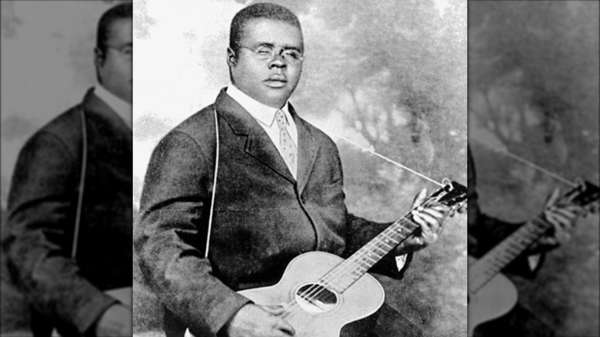
Background Information
Blind Lemon Jefferson was on a farm in Freestone County, Texas whose parents were sharecroppers. His exact date of birth is unknown and differs depending on the source. Census records say that he was born on September 24 1893, while Jefferson wrote October 26, 1894 on his World War I draft registration papers. In fact, much of his life still remains a mystery. Historians and fans still theorize about his passing and the exact details of his early life. From what the little information that was uncovered, Jefferson was a blind person who taught himself to play guitar in his teens. His first performances took place at the Baptist church, country suppers, and in front of local buildings in neighboring towns. When he got older he moved to Dallas living by the railroad, where he would go to mentor Lead Belly who wanted to know how to play guitar. Jefferson was signed to Paramount Records in the mid 1920’s, but unsurprisingly there are two different versions of this story that are told. However, his most memorable music was under the label OKeh Records that he moonlighted for in 1927.
Jefferson Blues and Okeh Records
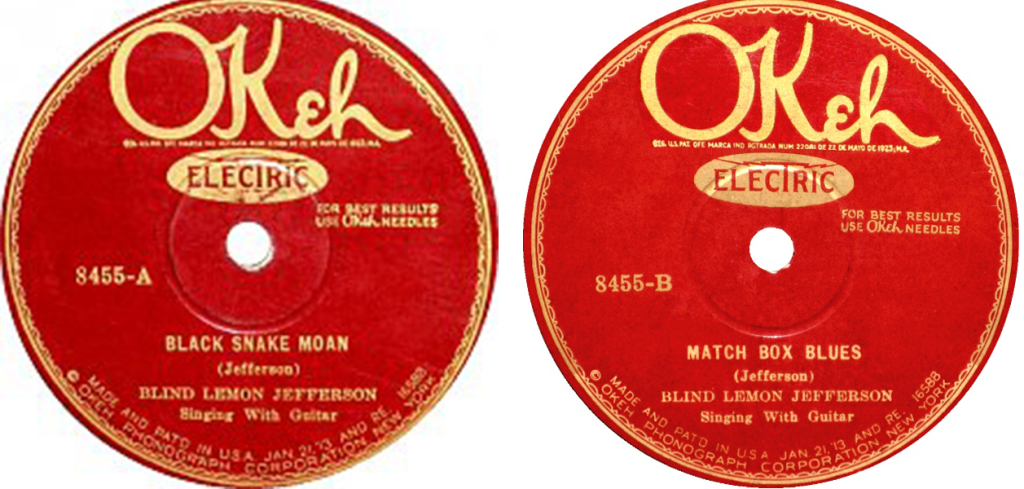
Blind Lemon Jefferson is considered to be a pioneer of the blues genre and is the most famous American bluesman of all time. He inspired artists like B.B King, John Hammond, Reverend Gary Davis, and T-Bone Walker, who were all famous musicians who publicly praised his work. Jefferson only used a guitar in his music, but that was only second to his iconic vocals. His voice was described as “wailing”, that often “pierced enough to be heard above the clang and din of city streets”. His voice and the guitar complimented eachother and often conversed in a sort of musical conversation. For example, the guitar would repeat a melody after a verse, and vise versa. A signature technique he used was pulling on the strings of his guitar to make notes last longer, or to produce an “unclean sound”. Yet another trick he uses is when he uses a series of solo guitar flourishes at the end of each vocal line. The best example of this is best heard at the end of his hit song “Black Snake Moan”.
The lyrics in his music were also very well crafted which ranged from compelling and heartbreaking to risque’ and comical. Sexual innuendos mixed with deep meanings seems to be a common theme in his music for the most part. His songs “Black Snake Moan” and “Match Box Blues” recorded for Okeh Records are his most well known, but have different versions that were previously recorded for Paramount studios. The songs that I chose to include represent periods of Jefferon’s personal life and sociopolitical trends at the time of the songs release.
(The) Black Snake Moan
Black Snake Moan is a song that has no clear meaning, and is up to interpretation. Some see it as a harrowing tale of a blind man afraid of what he cannot see, and others pick up on the set of lyrics that have sexual innuendos. The interpretation depends on what listeners think when they hear “black snake”. Is there a fear of the unknown represented as a snake in darkness, waiting to pounce? I personally interpret it to be reflective of the struggles Jefferson faces as a black and blind person in America during this time. He was not only discriminated against because of his race but there was even further alienation because of his blindness. I see it as this constant hyper-vigilance and anxiety that he must have felt. Knowing that there is potential danger but not being able to look around you sounds very scary.
An alternate point of view is seeing the “black snake” as well… You can probably figure out what other meaning could be. The use of the word “moan” is a hint.
Mmm, black snake crawlin’ in my room, Mmm, black snake crawlin’ in my room, And some pretty mama had better come here and get this black snake soon
Black Snake Moan (The Movie)

Take the song “Black Snake Moan,” for instance. It’s the song Blind Lemon Jefferson wrote about the fear and sadness of losing his sight and being left alone in the growing darkness. It’s one of Brewer’s favorites and the inspiration for his new film of the same name. “I’m a huge fan of the blues,” the writer-director said in a recent phone interview. “I’ve been a huge fan since I was 12. It was time for me to make a blues movie. And the blues is filled with parable and fable and biblical and sexual imagery. It’s like one big stew.”
Oklahoman article written by Gene Triplett
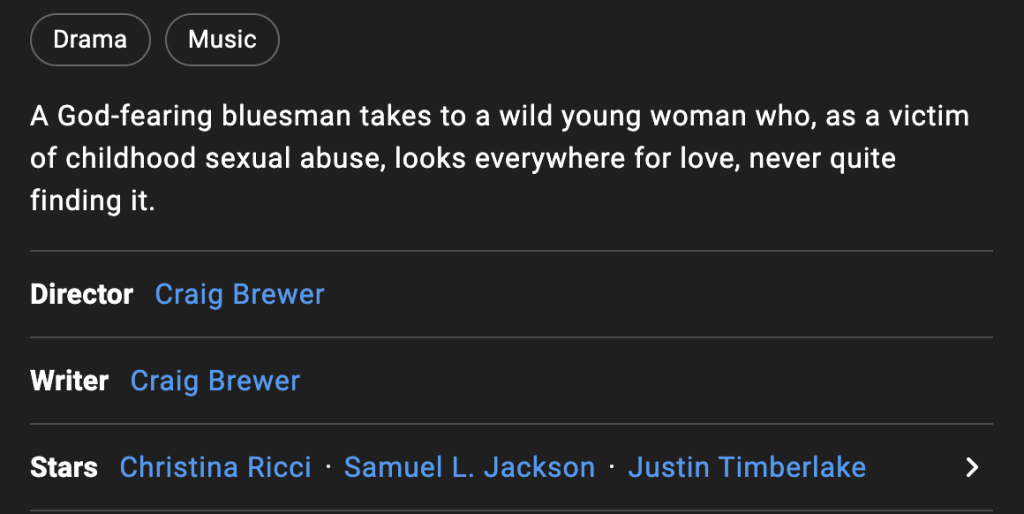
Black Texans and the Oil Patch Blues
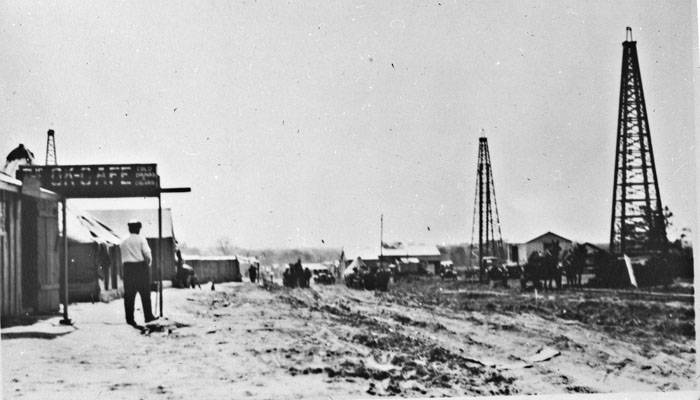
Employment for black males post emancipation were very limited, even in a booming industry. Black texans were hired to as janitors, cooks, mechanics, or people who hauled equipment and wood. They helped to build the refinery for the Humble Oil and Refinery Company, classified as “unskilled workers”. Unfortunately but unsurprisingly, white workers protested against this. They claimed that black workers were “taking up jobs that some white man probably would be glad to have.” Below is a disturbing quote from a worker, talking about the way black workers were treated and how white people viewed them.
“Now they wont allow no n***** to do oil work. They can drive a truck and go through there with a little lumber and anything like that, you can have n***** drivers. But you can’t get out and take the brake and drill for oil. We just won’t stand for it”
William Joseph Philip, a worker at the Spindletop oil field near Beaumont, TX
The Jim Crow laws that followed created even more challenges for black texans, especially in the oil fields. They were suddenly excluded from local restaurants, cafes, and shunned from public housing. Despite the oil industry’s racist history, black musicians were the first to record songs about the oil wells. Blind Lemon Jefferson is only one of many of these blues musicians to start the trend. His song “Oil Well Blues” is one of the first ever recorded oil song. The sexual allusions that he uses in the song reflects the culture of the job, because it so happened that some of the terminology had sexual connotations (laying pipe, pump jacks rocking, rotating tool, etc). There are also some personal references by Jefferson, including “Woodbine Sand”. This references the Woodbine Fault-Line that ran through his hometowns of Freestone and Limestone. In the background of the song, you could hear people working!
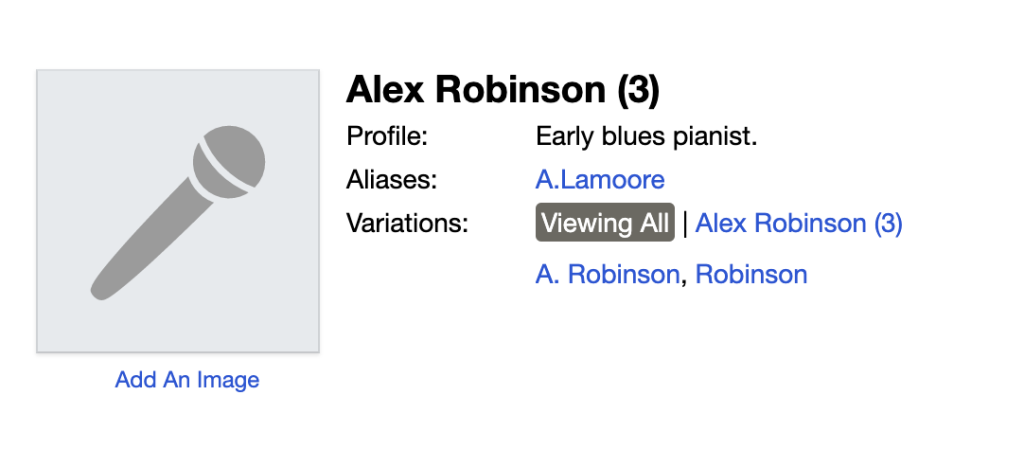
This song was written by Jefferson, but “LaMoore” (Alex Robinson) recieved credit for composing the song. In fact, he had done this to many other artists who signed for Paramount Records like Papa Charlie Jackson, Hattie McDaniel, and George Carter. I was not able to find out much about Alex Robinson besides this compilation of blues songs that was under his name.
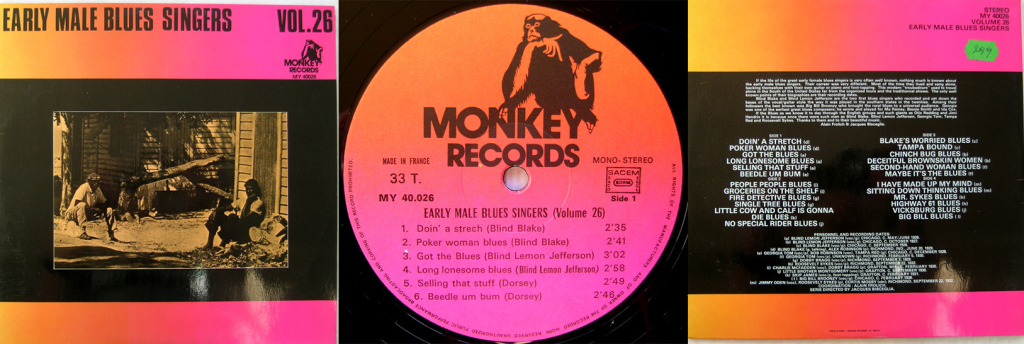
The Legacy of Blind Lemon Jefferson
Jefferson passed away in December 1929 in Chicago, but the circumstances of his death are still a mystery. Some say he died of a heart attack because of his obesity, others claim that he “got amongst the wrong bunch”, or from hypothermia. One story is that Jefferson had died in a snowstorm because the person who had promised to pick him up from the train station never showed up. It was much harder for him to hear and navigate his way through the snow around because of his blindness, which is why many think hypothermia may be a likely cause. Foul play was discussed only because of the song’s talk of his own death not long before his real passing. His body was brought to Wortham TX, where he was buried in an unmarked grave. 70 years later, the town created a custom headstone for Jefferson, engraved with the lyrics:
"Lord, it's one kind favor I'll ask of you. See that my grave is kept clean"
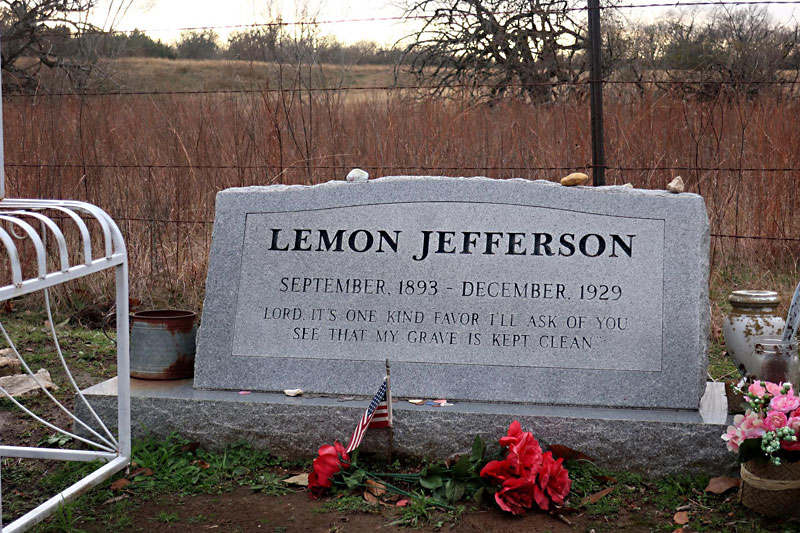
Sources
“Alex Robinson (3).” Discogs, www.discogs.com/artist/1648837-Alex-Robinson-3.
Evans, David. “Musical Innovation in the Blues of Blind Lemon Jefferson.” Black Music Research Journal, vol. 20, no. 1, 2000, p. 83, doi:https://doi.org/10.2307/779317.
Gary, Holly. “The Tragic 1929 Death of the Father of Texas Blues, Blind Lemon Jefferson.” Grunge, 12 Jan. 2023, www.grunge.com/1164976/the-tragic-1929-death-of-the-father-of-texas-blues-blind-lemon-jefferson/.
Obrecht, Jas. “Black Snake Moan” / “Match Box Blues”–Blind Lemon Jefferson (1927).
“ShieldSquare Captcha.” Www.songfacts.com, www.songfacts.com/facts/blind-lemon-jefferson/black-snake-moan.
Specht, Joe W. (2011) “Oil Well Blues: African American Oil Patch Songs,” East Texas Historical Journal: Vol. 49: Iss. 1, Article 9.
Texas State Historical Association. “TSHA | Jefferson, Blind Lemon.” Www.tshaonline.org, www.tshaonline.org/handbook/entries/jefferson-blind-lemon.
Triplett, By Gene. “‘Black Snake Moan’ Director Stirs Emotion with the Blues.” The Oklahoman, 2 Mar. 2007,
